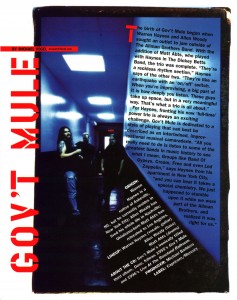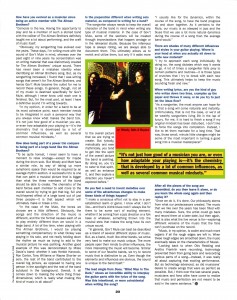(click on picture to open file)
By: Michael D. Vogel
© January 24, 1998. Michael D. Vogel. All Rights Reserved.
Published in:
The Album Network magazine – February 6, 1998
The birth of Gov’t Mule began when Warren Haynes and Allen Woody sought an outlet to jam outside of the Allman Brothers. With the addition of Matt Abts, who played with Haynes in the Dickey Betts band, the trio was complete. “They’re a reckless rhythm section,” Haynes says of the other two. “They’re like an earthquake with an ‘on/off’ switch. When you’re improvising, a big part of it is how deeply you listen. These guys take up space, but in a very meaningful way. That’s what a trio is all about.”
For Warren Haynes, who until recently shared guitar duties with Dickey Betts in the prolific Allman Brothers Band, fronting his now ‘full-time’ power trio is always an exciting challenge. Featuring drummer Matt Abts and former Allman bassist Allen Woody, Gov’t Mule is a band dedicated to a style of playing that can best be described as an intertwined, improvisational musical camaraderie. “All you really need to do is listen to some of the greatest bands in music history to see what I mean. Groups like Band Of Gypsy’s, Cream, Free and even Led Zeppelin,” says Haynes from his apartment in New York City, “and you can hear it takes a special chemistry. We just happened to stumble upon it while we were part of the Allman Brothers, and realized it was right for us.”
How have you evolved as a musician since being an active member with the Allman Brothers?
Warren Haynes: “Osmosis is the key. Having the opportunity to play and be a member of such a storied band with the caliber of the Allman Brothers definitely taught me a lot about performing, and the craft of music itself.
“Obviously, my songwriting has evolved over the years. These days, I’m writing more with the sound of Gov’t Mule in mind, whereas over the past eight or nine years my concentration was on writing material that was distinctively created for the Allman Brothers’ unique sound. There has never been a mistaken identity when identifying an Allman Brothers song. But, as my songwriting increased, I found that I was writing songs that weren’t for the Allman Brothers, and hence Gov’t Mule became the outlet for me to record these songs. In general, though, not all of my music is destined specifically for Gov’t Mule, although I never know until each one is finished. But, for the most part, at least I have a definitive sound I’m writing towards.
“In my opinion, in order for a band to be at its most cohesive point, each member needs to be integrated in such a personal way that you always know what makes the band tick. It’s not just how good of a musician you are, or even how adaptable your playing is– it’s the chemistry that is developed by a lot of common influences, as well as several common musical mindsets.”
How does being part of a power trio compare to being part of a large band like the Allman Brothers?
WH: “To be quite honest, I never seem to have a moment to relax onstage–expect for maybe during the drum solo. But Woody and Matt have a similar role, by way of taking up more symphonic space than would be required by an average rhythm section. A successful trio is one that can paint a musical picture that is bigger than what the three members of the band should be able to create. The chemistry of the band forces each member to add more to the overall sound by trying to get that big, full and multi-layered effect of a large band out of just three people–it is that aspect which will ultimately make or break a trio.
“In the case of the Mule, the tones we choose are a little different. Obviously, the songs and the direction of the music are different, and the trio format causes each of us to play entirely different than we would in a large band. A lot of the time, when playing with the Allman Brothers, I would be playing something complementary to what Dickey was playing in his solo, and not really holding down the rhythm as much as trying to add to the musical picture he was painting. Another good example of this was demonstrated by Miles Davis’s band. Whether it was Herbie Hancock, Ron Carter, Tony Williams or Wayne Shorter on solo, the rest of the band contributed to the overall big picture, as opposed to having one person in the spotlight and the rest of the band subdued in the background. Overall, it all comes down to making the whole thing three-dimensional, which is really what making this kind of music is all about!”
Is the preparation different when writing solo material, as compared to writing for a band?
“The songwriter always needs to keep the overall character of the band in mind when writing any type of musical material. In the case of Gov’t Mule, some of the sections will be created through improvisations that happen onstage or in the rehearsal studio. Because the infamous tape is always rolling, we are always able to document them. This ultimately allows us to revisit and utilize them, but only if it adds more to the overall picture that we are trying to create. But lyrically, melodically and even rhythmically, you tend to get into the spirit of the overall picture the band is painting. By doing so, you try to cater to that spirit, as well as enhance it, and then explore a direction you haven’t explored before.”
Do you feel a need to invent melodies over some of the adventurous changes to make these kinds of things happen?
“I make a conscious effort not to stay in a pre-established realm or genre. I know what I don’t like–and that’s cliché blues-rock! I always like for there to be some sort of exciting element, whether it be coming from a jazz direction or a folk base or whatever, something thrown into the musical stew that makes the song have its own unique sound.
“In general, Gov’t Mule can best be described as a blend of several different styles of music. But, as a band, much like other bands, we strive very hard to make our music unique. The more people open their minds to other influences, the more interesting the music will become. Similar to some our favorite bands, we try to record music that is distinctive to us. Even though the elements and influences are obvious, the sound is unique to the band itself.”
The lead single from Dose, “Blind Man In The Dark,” shows an incredible ability to interplay the guitar parts with the lyrics of the song. Was this intentional, or more coincidental when writing the song?
“I usually like for the dynamics, within the course of the song, to have the band progress up and down together. As it pertains to the Mule, our music is so steeped in jazz and the blues that we use a lot more natural dynamics during the course of a song than the average band would.”
There are shades of many different influences and styles in your guitar playing. Where is your head at when you actually sit down to write new material?
“I try to approach each song individually. By doing so, the song dictates which way it wants to go. A lot of times a songwriter falls prey to certain patterns and routines–it is those types of crutches that I try to break with each new song. This ultimately helps to keep the music sounding fresh and new.”
When writing lyrics, are you the kind of guy who writes down two lines, crumples up the paper and throws it away, or do you try to just let the ideas flow?
“As a songwriter, the most anyone can hope for is that a song will come naturally and instantly. Unfortunately, that is not the case, or we’d all be wealthy songwriters living life in the lap of luxury. For me, it is hard to finish a song if my original mindset has been disturbed. I don’t like to force the songs into completion. Instead, I like to let them marinate for a long time. That way, those small, minute little changes might be some of the most important in turning a good song into a musical masterpiece!”
After all the pieces of the song are assembled, do you then leave it alone, or do you learn the whole song again and then replay it?
“Once we do it, it’s done. Our philosophy stems from what our predecessors created. The music that we like over the years has been filled with many mistakes. Sure, the artist could go back and record them at a later date, but then again, that is also what the live venue is for–exploring different versions of the music that the fans can’t purchase on the record.
“Music, in my opinion, is cooler and much more organic if all the rough edges are left in. When these rough edges are smoothed down, the music eventually takes on the characteristics of Muzak.
“Looking back to when Otis Redding and Aretha Franklin were recording, technology prevented them from going back and re-recording various parts of a song–instead, it was really all about capturing that exciting performance. But as technology advanced, so did musicians’ desire to create songs that were as perfect as possible. But, I think over the last several years, musicians and fans alike have come to realize that music and perfection are not meant to be said in the same sentence.” ^m^
Photograph credit: Danny Clinch
Origin:
Warren Haynes, a native of Asheville, NC, currently resides in New York City; Allen Woody, born and raised in Nashville, and rounding out the trio is Oklahoma-born Matt Abts, who has relocated to Los Angeles.
Line-Up: Website:
Warren Haynes – Vocals & Guitars www.mule.net
Allen Woody – Bass
Matt Abts – Drums
About The Current CD:
After a pair of previous albums, 1995′s Gov’t Mule and 1996′s Live At The Roseland Ballroom, Gov’t Mule is set to release their third album, Dose, the first for Capricorn Records.
Discography:
Dose (Capricorn/Mercury, 1998)
Live At The Roseland Ballroom (Foundation, 1996)
Gov’t Mule (Relativity, 1995)
Produced By:
Michael Barbiero
Label:
Capricorn/Mercury
© January 24, 1998. Michael D. Vogel. All Rights Reserved. This originally appeared on the Vogelism blog at https://www.vogelism.com, authored by Michael D. Vogel. This article may be shared or reprinted as long as the entire copyright message, including the source location of this article, accompanies it.














 Welcome to Michael D. Vogel’s online portfolio. I am a Los Angeles-based music journalist/content creator, and self-professed music-fanatic/radio-aholic. With more than 20 years of experience in multiple facets of the music industry including; music programming/air talent for terrestrial and internet radio as well as record label artist promotion, I have a finger on the pulse of what's new and under the radar in the emerging music scene. Areas of specific expertise include, but not limited to: rock (heritage, mainstream, heavy metal/hard rock and alternative), pop and adult contemporary, as well as radio, pop culture, sports, exercise and politics. I am applying my passion for music as a freelance writer for the Examiner as National Music Examiner (Examiner.com) in addition to West Coast Editor for FreeGotham (FreeGotham.com). Find me at michael@vogelism.com.
Welcome to Michael D. Vogel’s online portfolio. I am a Los Angeles-based music journalist/content creator, and self-professed music-fanatic/radio-aholic. With more than 20 years of experience in multiple facets of the music industry including; music programming/air talent for terrestrial and internet radio as well as record label artist promotion, I have a finger on the pulse of what's new and under the radar in the emerging music scene. Areas of specific expertise include, but not limited to: rock (heritage, mainstream, heavy metal/hard rock and alternative), pop and adult contemporary, as well as radio, pop culture, sports, exercise and politics. I am applying my passion for music as a freelance writer for the Examiner as National Music Examiner (Examiner.com) in addition to West Coast Editor for FreeGotham (FreeGotham.com). Find me at michael@vogelism.com. 
The most difficult thing is to find a blog with unique and fresh content but your posts are not alike. Keep it like this.